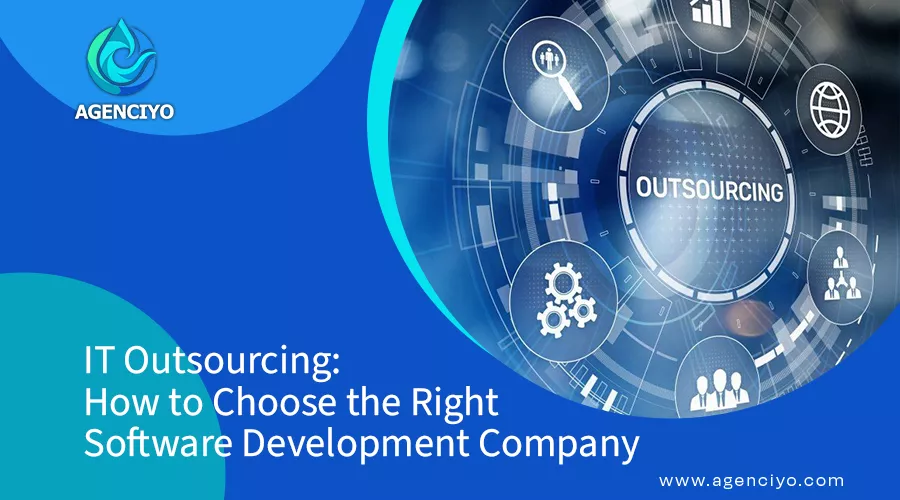In today’s digital revolution, outsourcing your software development requirements could be a savior. Whether you are a startup that needs to rush to the market. Or a well-established business that wants to scale effectively. The correct IT outsourcing company can bring you the best global talent, accelerate development, and save costs. But how do you sort through a few hundred vendors and pick the correct one?
We’ve assisted companies in this decision here at Agenciyo. What you’ll see below are the breakdowns for deconstructing the most critical things that you must do. Selecting an appropriate software development firm for outsourcing software.
How to choose the right software development company
Define Your Business Needs First
Take some time prior to beginning your search for a development partner. And get completely clear on what you require. Do you have to develop a product from the ground up? Do you require perpetual support for older software? Or do you have staff augmentation holes that need to be filled? Explore More: How to choose the right custom software development partner the expert guide
Knowing the scale, timing, and objectives of your project will assist you in deciding on the kind of outsourcing engagement you need: onshoring, nearshoring, or offshoring. It will guide you on your budget, technology stack needed, and collaboration model. Clarity here ensures that you hire the right type of partners and eliminate misaligned options upfront.
Select the Appropriate Outsourcing Model
There are a number of outsourcing models, and all of them have their pros and cons. Onshoring is outsourcing to a firm in your home country. The same time zones and culture are great, but with higher costs. Nearshoring is an IT outsourcing company to organizations from neighboring nations with the same time zones as yours. Great cost-collaboration trade-off. You May Also Read: Complete Guide to IT Outsourcing: Models, Costs, and Strategy (2025)
Offshoring would generally mean the employment of teams from distant countries. Such as Canada or the Philippines. The model is low-cost but might be time zone or communication-averse. Your selection is a function of your project’s complexity, needed communication frequency, and available budget. For instance, nearshoring may suit long projects that need high communication frequency, whereas offshoring suits structured, independent work.
Shortlist Vendors with Proven Records
Once you have an idea of what you are looking for, it’s time to shorten it to a shortlist. Obtain word of mouth from your network. Then, dig deeply into each firm’s website and portfolio. The objective is to find companies that not only possess technical expertise but also understand your business space. When evaluating an IT outsourcing company, look for the following:
- Similar project case studies
- Client testimonials
- Technical certifications
- Awards or recognition
- Business years and team size
- Industries served
Assess Technical Skills
A pretty website or a chic sales pitch does not equate to the correct technical skills for your project. Dig deeper into your prospective partner’s technical skills. Ask yourself these questions:
Do their developers understand the programming languages or frameworks you need? Do they have experience in creating products like yours? What kind of development methodologies do they adhere to (Agile, Scrum, DevOps)? Are they spending money on continuous learning and upskilling employees? Ask them to share sample code, perform a technical interview, or even request a trial exercise to test the quality of their deliverables.
Evaluate Collaboration Habits
Good communication is the key to successful outsourcing. Pay close attention to how responsive, transparent, and proactive a vendor is during your first conversations. A good outsourcing IT service provider won’t only code but will work alongside you. They’ll brainstorm, identify risks, and keep you abreast of progress every step along the way. This usually says a lot about how they’ll act once an agreement is inked. Major things to consider: partnering with an IT outsourcing company that values communication as much as technical skills.
- Communication in your choice language
- The use of project management tools (such as Jira, Trello, or Asana)
- Established communication protocols and report schedules
- Time zone overlaps and availability for real-time conferences
Pricing Models and Contracts
Clear pricing must be practiced in order to eliminate cost blowouts. Negotiate and know what you are getting in the price. Ownership of code, support, project management, tools, etc. Also, read their contract carefully for provisions regarding intellectual property, termination, and data protection. Most software development firms utilize these pricing models:
- Fixed price: Perfect for short, clearly defined projects. You exactly know what you’re paying for.
- Time and material: Inexpensive dynamic project model. You are billed by the hour.
- Dedicated team: Best for projects that will last more than several weeks. You pay a monthly rate for a dedicated team.
Review Security and Compliance
When software is done off-site, you are outsourcing sensitive information and intellectual property to a third-party company. Ensure that they treat it in the same manner that you would. Ask them how they manage access control, incident response, and employee background checks. A good partner should have security built into every step of their process.
What to look for:
- GDPR or HIPAA compliance, depending on your industry or location
- Data encryption and secure development practices
- NDA agreements
- Security certifications such as ISO/IEC 27001
Check for Cultural Fit and Company Values
Beyond technical skills, it’s also worthwhile to partner with a group whose culture aligns with yours. Investigate their mission, work culture, and employee satisfaction. Scroll through their blogs, social media, or Glassdoor reviews to gauge their internal environment. Why is this crucial? Teams that are aligned with your values will better understand your vision, communicate well, and create long-term connections. Choosing an IT outsourcing company that shares your values can lead to a more cohesive and productive partnership.
Start Small and Scale Judiciously
If the pilot is successful, you can grow the partnership safely. Maybe even increasing the team or outsourcing additional parts of your tech stack. Start with a pilot project before locking into a long-term collaboration. This enables you to:
- To evaluate the responsiveness and quality of work of the team
- To learn how they manage deadlines and criticism
- verify if they deliver on their promises
Create a Long-Term Partnership
Identifying the right outsourcing partner is not a one-time decision. It’s the start of a long-term partnership. Occasionally, review the performance of your outsourcing partner. Have retrospectives, give feedback, and set up a system of mutual accountability. A great software development partner isn’t just a vendor. They’re an extension of your team. Choosing the right IT outsourcing company can ensure that investment turns into long-term success. Invest in that relationship, and you’ll reap the rewards for years to come.
Conclusion
Outsourcing in Software development can propel your business forward, provided that you select the correct partner. Take your time to compare, assess, and establish relationships. At Agenciyo, custom software development company we are committed to open communication, technical expertise, and customer-oriented values. If you are planning to outsource IT services and want expert advice, we are here to assist you. Contact us and let’s build something great together.


